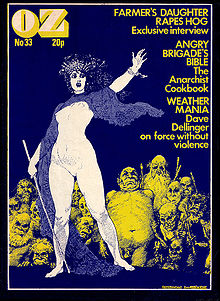
Back چاپەمەنی ژێرزەمینی CKB Untergrundliteratur German مطبوعات زیرزمینی FA Presse underground des années 1960 et 1970 French Pers bawah tanah ID 地下出版 Japanese 지하 언론 Korean Illegale pers Dutch Undergrunnspresse NB අසම්මත මාධ්ය SI

The terms underground press or clandestine press refer to periodicals and publications that are produced without official approval, illegally or against the wishes of a dominant (governmental, religious, or institutional) group. In specific recent (post-World War II) Asian, American and Western European context, the term "underground press" has most frequently been employed to refer to the independently published and distributed underground papers associated with the counterculture of the late 1960s and early 1970s in India and Bangladesh in Asia, in the United States and Canada in North America, and the United Kingdom and other western nations. It can also refer to the newspapers produced independently in repressive regimes. In German occupied Europe, for example, a thriving underground press operated, usually in association with the Resistance. Other notable examples include the samizdat and bibuła, which operated in the Soviet Union and Poland respectively, during the Cold War.